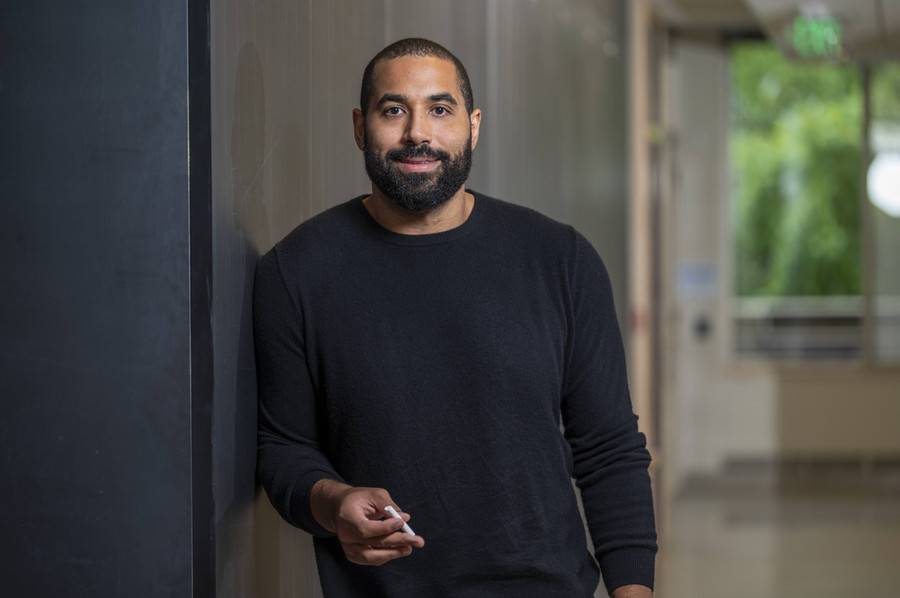Eight Professors Appointed to Named Chairs
By Bowdoin NewsEight Bowdoin professors—including one assistant and one associate professor—have been appointed to named chairs at the College in recognition of their achievements as scholars and educators. The appointments, which are effective immediately, were announced by Bowdoin President Clayton S. Rose in a letter sent to each of the candidates at the recommendation of Senior Vice President and Dean for Academic Affairs Jennifer Scanlon and in consultation with senior members of the faculty Committee on Appointments, Promotion, and Tenure.
“Endowed chairs offer us the opportunity to honor and support individual faculty who contribute in powerful ways to the vibrant intellectual life of the College,” said Scanlon. “These chairs also honor the donors whose financial support makes this form of recognition possible. It has been my pleasure to review faculty accomplishments and recommend these eight faculty members from across the ranks and across the College to the president as endowed chair recipients.”
Meet the eight professors:
- Chryl Laird
- Adam Levy
- Collin Roesler
- Vyjayanthi Selinger
- Jennifer Taback
- Shu-chin Tsui
- Dharni Vasudevan
- Hanétha Vété-Congolo
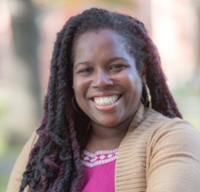
Chryl Laird has been named the Marvin H. Green Jr. Assistant Professor of Government. A professor at Bowdoin since 2017, Laird studies American politics with a specialization in race and ethnic politics and political psychology. She is the coauthor, with Ismail White, of the 2020 book Steadfast Democrats: How Social Forces Shape Political Behavior, which examines how Black partisanship to the Democratic Party is maintained through social networks and political norms. In addition to a wide array of peer-reviewed articles, she has written for The New York Times, The Atlantic, The Washington Post, and other media outlets and has been interviewed on programs like NPR’s Morning Edition and All Things Considered, MSNBC’s Morning Joe, and many others. She is a current board member for the Maine Center for Economic Policy. In 2018, Laird delivered the Karofsky Faculty Encore Lecture, selected by students based on teaching excellence and influence. Laird earned dual bachelor of arts degrees at the University of Maryland–College Park in government and politics and African American studies, and her master’s degree and PhD in political science at the Ohio State University.
Inspired by the work of her professor and mentor at the University of Maryland, scholar and analyst of Black political behavior Linda Williams, Laird says, “It is vital that students feel comfortable in the classroom to have respectful, thoughtful, and dynamic discussion on topics that are often seen as challenging.”
The Marvin H. Green Jr. Assistant Professorship was established in 1990 by Marvin H. Green Jr. of the Class of 1957.
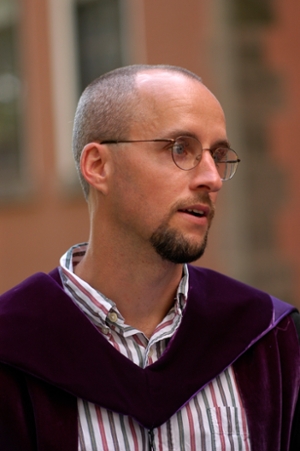
Adam Levy is appointed the Viola Ward Brinning and Elbert Calhoun Brinning Professor of Mathematics. Levy’s research interests include optimization, which, he explains, “pulls in people who like math but also people who like to solve real problems.” In a 2020 seminar for faculty colleagues, Levy explained how planning an airline hub and renovating a museum are just two of the problems that can be tackled by mathematicians using the process of optimization. Levy’s 2009 book, The Basics of Practical Optimization, is regarded as a key text for introducing students to the subject and its uses for relevant and realistic problems. His research also covers variational analysis and numerical methods, while in addition, he enjoys teaching multivariable calculus and linear algebra. In 1997 Levy, who earned his PhD at the University of Washington, was awarded the Sydney B. Karofsky prize for excellence in undergraduate teaching. Levy estimates he has taught around 2,000 undergraduates during his more than two-and-a-half decades at Bowdoin.
“I’m extremely grateful and honored to receive this recognition,” says Levy. “I’ve happily spent my entire career at Bowdoin, and this chair is a wonderful milestone in that experience.”
The accompanying funds, he explains, will help Levy explore projects merging ideas from the two very different research areas in which he’s worked over the past thirty years.
The Brinning fund was established by Dr. David Brinning in memory of his parents, Viola Ward Brinning and Elbert Calhoun Brinning, to support faculty members in the fields of physics, mathematics, chemistry, biology, or botany.
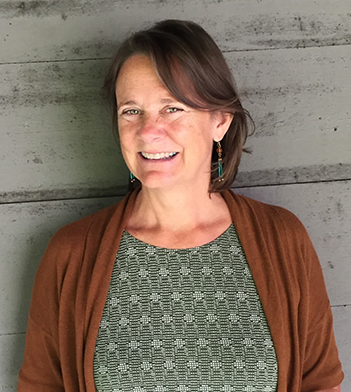
Collin Roesler has been named the William R. Kenan Professor of Earth and Oceanographic Science. Roesler’s teaching focuses on oceanography. She is an observational oceanographer who develops methods for extracting ecological and physiological information about ocean ecosystems from optical measurements collected from ships, moorings, and satellites. She is particularly interested in how phytoplankton communities respond to environmental forcing. This had led to research on seasonal patterns in phytoplankton communities in the Gulf of Maine and the Mediterranean Sea; harmful algal blooms in the Gulf of Maine, Benguela Upwelling System, and Arabian Sea; impacts of sea ice thickness and snow cover on Arctic sea ice algae; iron fertilization by green icebergs around Antarctica; and, most recently, how phytoplankton communities impact the transport of atmospheric carbon dioxide to the deep sea. Among her many professional activities, she has been a science team member for NASA’s Plankton, Aerosol, Cloud, ocean Ecosystem (PACE) and EXport Processes in the Ocean from Remote Sensing (EXPORTS) missions in preparation for the PACE satellite launch in 2023. She has published more than seventy-five papers, eight of which are first-authored by Bowdoin students. In 2013, students honored Roesler's teaching and mentoring by selecting her to deliver the Karofsky Faculty Encore Lecture.
“Teaching,” she says, “is the most gratifying part of my job. For each student, I try to figure out what their goals and intentions are for taking my course and to help them achieve those goals. Students come to my courses for a variety of reasons, so the challenge for me is to reach all of them with the same course. I love that challenge.”
Roesler earned her bachelor’s degree at Brown University, a master’s degree at Oregon State University, and her PhD at the University of Washington.
The Kenan Professorships were established in 1975 with a grant from the William R. Kenan Jr. Charitable Trust in honor of William R. Kenan Jr., an accomplished chemist, engineer, and agricultural scientist.
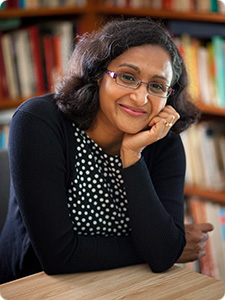
Vyjayanthi Selinger has been named the Stanley F. Druckenmiller Associate Professor of Asian Studies. A scholar of medieval Japan, Selinger has taught at Bowdoin since 2005 and focuses her research on the ways in which literature attempts to symbolically resolve historical and cultural conflicts. Her first book, Authorizing the Shogunate, focused on how the medieval epic The Tale of the Heike uses ritual symbolism to contain the historical tumult of the Genpei War (1180-1185), the war that gave birth to warrior power. Her second monograph, The Law in Letters, currently in progress, examines how medieval Japanese theatrical texts exploit the dramatic tension of contemporary legal disputes, in turn commenting on warrior power and social marginality. Selinger also has an interest in the field of world literature and has published two articles exploring the intercultural travel of literary texts: The Tale of the Heike as language primer for Jesuit missionaries in the sixteenth century, and the travel of the Indian epic Ramayana to Japanese shores in the twelfth century. Her courses range from medieval to modern topics, including Japanese animation, samurai culture, monster culture, and Japanese WWII memory.
“My students bring such passion and drive—even in the remote format—to learn about how other societies see and represent themselves,” Selinger says. “Their curiosity drives my research and teaching.”
Selinger, who earned her BA at Jawaharlal Nehru University, a master’s at Harvard, and her PhD at Cornell University, was a Fulbright Core Scholar (2017–2018) and an executive committee member of the Modern Languages Association Forum: Japanese Literature to 1900 (2015–2018).
The chair was established by Stanley F. Druckenmiller ’75, H’07.
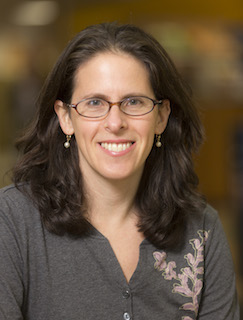
Jennifer Taback is appointed the Isaac Henry Wing Professor of Mathematics. Taback’s research lies at the intersection of algebra and geometry, focusing on metric and combinatorial properties of infinite groups. Her work in the field of geometric group theory uses geometry to provide innovative insight into abstract algebraic problems. While at Bowdoin, Taback has been the sole principal investigator on three multi-year National Science Foundation research awards, and she currently holds a grant from the Simons Foundation. Taback, who earned a BA at Yale and both her master’s and PhD at University of Chicago, enjoys teaching a wide range of courses, from geometry to group theory to topology, and Introduction to Mathematical Reasoning, which welcomes students into the mathematics major. A thread common to her research and teaching is that highly theoretical mathematics has profound applications to questions that are important in today’s world. She has participated in the leadership of the American Mathematical Society, serving on both its Council and Executive Committee, and co-chairing a multimillion-dollar fundraising campaign to support young mathematicians. Taback is also passionate about mentoring young mathematicians, especially women and girls who might not consider mathematics as a major or a career. She administered a Luce Foundation grant supporting research projects for female undergraduates in STEM fields at Bowdoin, and she founded and runs the Bowdoin College Math Circle, an enrichment program for junior high school students, jointly with a colleague.
“I am honored to be the next Wing Professor of Mathematics,” she says, “following in the footsteps of mathematicians who have had a lasting impact on the profession and on Bowdoin College. I am especially proud to be part of the accomplished, diverse group of scholars who were just awarded these endowed chairs,” she adds.
Isaac Henry Wing, Bowdoin Class of 1856, gave Bowdoin $50,000 in 1906 to establish an endowed chair in mathematics to aid future students “in the prosecution of those studies in which my own youth especially delighted.”
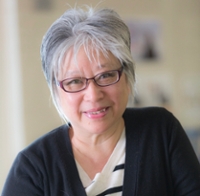
Shu-chin Tsui has been appointed Bowdoin Chair in Asian Studies. A scholar whose research interests extend across a number of interdisciplinary fields, including film studies, cultural studies, and visual art studies with a focus on gender politics, Tsui currently teaches a course on how cinema has treated pandemics throughout history and how, through film, we might comprehend the urgent subject confronting us. She has also taught about art and architecture in China’s urbanization, and that country’s ecological and environmental crises. Tsui has authored several books, including Women Through the Lens: Gender and Nation in a Century of Chinese Cinema and Gendered Bodies: Toward a Women’s Visual Art in Contemporary China. Tsui is currently at work completing Ecological and Environmental Turns: Re-Mapping China’s Landscape through the Lens of Eco-Cinema. “The manuscript is not just another publication but a call of critical attention to the pressing issues of ecological-environmental crisis that both the human and non-human world are facing,” said Tsui. She says a career highlight was being part of a team that curated the 2013 Bowdoin College Museum of Art exhibition, Break Through: Women Artists and Works in Contemporary China, which also led to the publication of an edited volume, (En)gendering: Chinese Women’s Art in the Making. Tsui recently was invited to join a reference group and work with the Lillehammer Art Museum (Norway) and Museum der Moderne Salzburg (Austria) as they prepare a comprehensive exhibition with the working title “Female Identities in Chinese Contemporary Art” to open in Lillehammer in May 2022.
“As the pinnacle of my academic career, the endowed chair is an honor I see as recognizing not only my achievements, but also the mentors, colleagues, and students who contributed to my development as a scholar, and, more broadly, the importance of international and racially diverse faculty in the academy,” Tsui said.
Tsui earned her BA at Xi’an Foreign Languages University, a master’s at University of Wisconsin–Madison, and both a second master’s degree and her PhD at University of Michigan–Ann Arbor.
The Bowdoin Chair in Asian Studies was established in 2000 by a donor who wishes to remain anonymous.
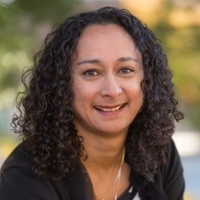
Dharni Vasudevan has been named the Stanley F. Druckenmiller Professor of Chemistry and Environmental Studies. Vasudevan’s research concerns the environmental fate of chemicals, such as pharmaceuticals and pesticides, and her work focuses on the mechanisms by which these compounds and related model substructures interact with surfaces in soil and aquatic environments. A professor at Bowdoin since 2004, Vasudevan was the chair of the Department of Chemistry from 2014–2018, and she currently serves as associate dean for faculty development and inclusion. In 2013–2014, she was a visiting scientist in the Exposure, Epidemiology, and Risk Program at the Harvard School of Public Health. Widely published (with Bowdoin student coauthors) in peer-reviewed publications and a frequent speaker at conferences and colleges and universities, Vasudevan has been awarded research grants from the National Science Foundation, the Merck/AAAS Undergraduate Science Program, the US Department of Agriculture, and many others. Vasudevan earned her bachelor’s degree in environmental engineering science from the Massachusetts Institute of Technology, where, she says, she “really got hooked (on environmental chemistry) when I discovered that chemical structure dictates chemical properties and their ‘personalities,’ which in turn determines how they behave in the natural environment, which in turn impacts human and wildlife exposure to them.”
“Both in classroom and in the research lab, I can help students discover that science and chemistry provide an important lens into understanding the environment,” said Vasudevan, “I have the joy and delight of supporting students to discover the inherent potential and skills they already have.”
She went on to earn a master’s in environmental engineering and a PhD in environmental chemistry from Johns Hopkins University. Vasudevan, who is jointly appointed to chemistry and environmental studies, routinely team-teaches with other Bowdoin professors, and leads students in her research lab, a group those students fondly refer to as “Team Dirt.”
The Druckenmiller Professorships were established by Stanley F. Druckenmiller '75, H'07.
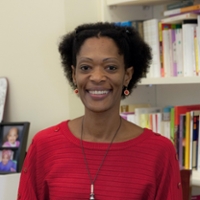
Hanétha Vété-Congolo has been named Henry Wadsworth Longfellow Professor of Romance Languages and Literatures. Vété-Congolo, who arrived at Bowdoin in 2001, is president of the Caribbean Philosophical Association and Membre d’honneur of the Groupe de Recherche et d’Études sur les Noirs d’Amerique Latine of the Université de Perpignan Via Domitia in France. A French Black studies and French postcolonial studies scholar whose research spans African, Caribbean, French, and gender and women’s studies, her most recent book, Nous sommes Martiniquaises. Pawòl en bouches de femmes châtaignes: une pensée existentialiste noire sur la question des femmes, was published in 2020 (L’Harmattan), while Discours AntillaisE is forthcoming in 2021 with Éditions Complicités in addition to two coedited chapter books. A poet, Vété-Congolo has published Avoir et Être : ce que j’Ai, ce que je Suis (Le Chasseur Abstrait, 2009) and Mon parler de Guinée (L’Harmattan, 2015). Her unpublished collection of poetry, Womb of a Woman, was shortlisted for the 2015 Small Axe Literary Competition. Vété-Congolo teaches courses on culture, literature, philosophy, critical thought, gender and women from the French speaking world of the Caribbean and Africa, and has organized several national and international conferences.
“It is an honor to have the significance of one’s work recognized by an institution like Bowdoin,” Vété-Congolo said. “Doing Black studies in French has always been like existing within the most invisible part of a non-nameable and non-identified object. Students have nevertheless fueled my energy and passion. They give meaning and direction to much of what I do.”
Vété-Congolo earned a BA, MA, DEA, and her PhD at the Université des Antilles et de la Guyane.
The Longfellow Professorship was established by the College’s governing boards in 1876.
